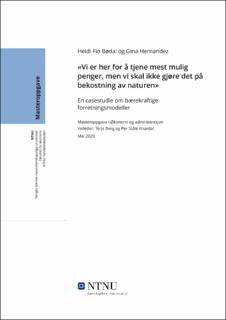| dc.contributor.advisor | Berg, Terje | |
| dc.contributor.advisor | Knardal, Per Ståle | |
| dc.contributor.author | Bødal, Heidi Flo | |
| dc.contributor.author | Gabrielsen, Gina Hernandez | |
| dc.date.accessioned | 2021-09-14T17:16:55Z | |
| dc.date.available | 2021-09-14T17:16:55Z | |
| dc.date.issued | 2020 | |
| dc.identifier | no.ntnu:inspera:55685018:60070454 | |
| dc.identifier.uri | https://hdl.handle.net/11250/2777205 | |
| dc.description.abstract | Global oppvarming og rovdrift av naturressurser kan ses på som to av de viktigste problemene
i verden. Dagsaktualiteten til temaet bærekraft øker stødig i samsvar med fokus på lavere
utslipp og klimavennlige løsninger. Formålet med vår studie er å undersøke hvordan
bærekraft kan innvirke på en forretningsmodell, samt redegjør for forholdet mellom et
selskaps økonomistyring og implementering av bærekraftige tiltak. I oppgaven benyttes en
enkelt casebedrift, NutriMar AS, ettersom selskapet har en sirkulærøkonomisk
forretningsidé.
Overordnede problemstilling for oppgaven er:
Hvordan samspiller bærekraft og økonomistyring, og vil dette samspillet påvirke
selskapets konkurransekraft?
For å svare på problemstillingen har også følgende forskningsspørsmål blitt utviklet:
1. Hvordan samspiller styringsmekanismene i en bærekraftig forretningsmodell?
2. Hvilke utfordringer kan oppstå knyttet til å realisere både lønnsom og bærekraftig
utvikling?
For å svare på problemstillingen benyttet vi et kvalitativ forskningsdesign, med både
intervjuer og dokumentstudier. Det ble totalt gjennomført åtte intervjuer av informanter med
ulike stillinger i NutriMar. Funn fra intervjuene og dokumentstudier ble analysert mot
tidligere forskning på temaet bærekraft, situasjonsbestemt teori og styringssystemer som en
pakke. Vi valgte å bruke Simons fire kontrollnivåer som rammeverk for analyse av
styringssystemet. I vår studie baserer vi begrepet bærekraft på den tredelte bunnlinjen, som i
tidligere forskning inkluderer klima og miljø, sosiale forhold og økonomi.
Studiens funn tyder på at den økonomiske bunnlinjen i bærekraftsbegrepet prioriteres over
den sosiale og miljømessige. Argumentene tar utgangspunkt i oppfatningen om at bærekraftig
økonomi er grunnleggende i forretningsdrift, slik at selskaper trenger økonomisk sikkerhet i
bunn for å videre kunne løse sosiale og miljømessige problemstillinger. Likevel finner vi
indikasjoner på at bunnlinjene samspiller i sentrale avgjørelser, spesielt i forbindelse med
NutriMars investeringsfokus. Samfunnets stadig økende oppmerksomhet rundt temaet
iv
bærekraft bidrar til at konkurransekraft styrkes gjennom den sosiale og miljømessige
bunnlinjen, og således videre forsterker den økonomiske bærekraften.
For vår casebedrift finner vi utfordringer både i retning av muligheter og fallgruver.
Muligheter knytter seg spesielt til konkurransekraft gjennom differensiering og kundeforhold,
mens fallgruver omfatter negative eksternaliteter som problemer med lukt, og
miskommunikasjon som fører til negativ omtale. Ettersom NutriMar er et relativt lite selskap i
utvikling finner vi overvekt av interaktive styringsmekanismer i forretningsmodellen, men
også indikasjoner på grense-, tros- og diagnostiske mekanismer. Som Simons (1995)
poengterer i sitt rammeverk er samspillet mellom mekanismene sentralt, noe vi i vår case
finner flere indikasjoner på. | |
| dc.description.abstract | Global warming and extensive exploitation of natural resources are some of the most pressing
issues facing modern societies. The day-to-day sustainability theme is steadily increasing in
line with the focus on lower emissions and climate-friendly solutions. The purpose of our
study is to investigate how sustainability can affect a business model, as well as explain the
relationship between a company’s financial management and the implementation of
sustainable measures. The project uses a single case company, NutriMar AS, which has a
circular economic business idea.
The overall issues for the assignment are:
How do sustainability and financial management interact, and will this interaction
affect the company’s competitiveness?
To answer the problem, the following research questions have also been developed:
1. How do the management mechanisms interact in a sustainable business model?
2. What challenges can arise in realizing both profitable and sustainable development?
To answer these questions, we used a qualitative research design, with both interviews and
document studie. A total of eight interviews were conducted with personnel working in
different positions in the company. Findings from the interviews and litterature review were
analyzed and the findings compared against the research literature on sustainability,
situational theory and management systems. We chose to use Simon's four control levels as a
framework for analyzing the management system. In our study, we base the concept of
sustainability on the triple bottom line, which in previous research includes climate and
environment, social conditions and economics.
The findings indicate that the economic bottom line is prioritized over social and
environmental factors. Sustainable economics is fundamental to business operations, thus
companies need financial security at the bottom in order to further solve social and
environmental issues. Nevertheless, we find indications that the three bottom lines interact in
key decisions, especially in connection with NutriMar's investment focus. Society's everincreasing
focus on sustainability contributes to strengthening competitiveness through the
social and environmental bottom line, and thus further enhances economic sustainability .
vi
We find evidence of several opportunities and pitfalls related to sustainable operations in the
analysis of the case business. Opportunities are particularly linked to competitiveness through
differentiation and customer relationships, while pitfalls include negative externalities such as
odor problems and miscommunication leading to negative public relations. As NutriMar is a
relatively small company in growth, we find the overweight of interactive management
mechanisms in the business model, but also indications of boundary, belief and diagnostic
mechanisms. We find indications of interaction between several types of management control
systems, which is central to achieve long-term sustainable economic growth. | |
| dc.language | | |
| dc.publisher | NTNU | |
| dc.title | «Vi er her for å tjene mest mulig
penger, men vi skal ikke gjøre det på
bekostning av naturen» | |
| dc.type | Master thesis | |
